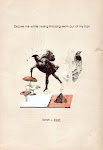Happy Fernando Pessoa's birthday. Here is a little of The Book of Disquiet, rendered by two different translators.
You want to travel? To travel you simply need to exist. In the train of my body or of my destiny I travel from day to day, as from station to station, leaning out to look at the streets and the squares, at gestures and faces, always the same and always different as, ultimately, is the way with all landscapes. (Margaret Jull Costa, p. 75)
I envy all people, because I’m not them. Since this always seemed to me like the most impossible of all impossibilities, it’s what I yearned for every day, and despaired of in every sad moment. (RZ, p. 39)
I envy in everyone the fact that they are not me. Of all impossibilities, and this always seemed the greatest, this was the one that made up the greater part of my daily dose of anguish, the despair that fills every sad hour. (MJC, p. 139)
I’m astounded whenever I finish something. Astounded and distressed. My perfectionist instinct should inhibit me from finishing; it should inhibit me from even beginning. (RZ, p. 136)
I’m always astonished whenever I finish anything. Astonished and depressed. My desire for perfection should prevent me from ever finishing anything; it should prevent me from even starting. (MJC, p. 129)
I have no social of political sentiments, and yet there is a way in which I’m highly nationalistic. My nation is the Portuguese language. It wouldn’t trouble me if all Portugal were invaded or occupied, as long as I was left in peace. But I hate with genuine hatred, with the only hatred I can feel, not those who write bad Portuguese, not those whose syntax is faulty, not those who used phonetic rather that etymological spelling, but the badly written page itself, as if it were a person, incorrect syntax, as someone who ought to be flogged, the substitution of i for y, as the spit that directly disgusts me, independent of who spat it.
Yes, because spelling is also a person. (RZ, p. 225)
I have no political of social sense. In a way, though, I do have a highly developed patriotic sense. My fatherland is the Portuguese language. It wouldn’t grieve me if someone invaded and took over Portugal as long as they didn’t bother me personally. What I hate, with all the hatred I can muster, is not the person who writes bad Portuguese, or who does not know his grammar, or who writes using the new simplified orthography; what I hate, as if it were an actual person, is the poorly written page of Portuguese itself; what I hate, as if it were someone who deserved a beating, is the bad grammar itself; what I hate, as I hate a gob of spit independently of its perpetrator, is the modern orthography with its preference of ‘i’ over ‘y.’
For orthography is just as much a living thing as we are. (MJC, p. 233)
For orthography is just as much a living thing as we are. (MJC, p. 233)




No comments:
Post a Comment